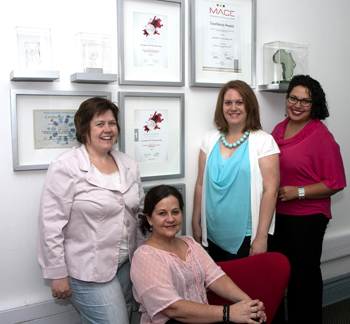
Staff from the Department of Communication and Brand Management received five awards at MACE 2014. From the left are: Leonie Bolleurs (Excellence awards for the Internet Broadcast Project and the B Safe safety campaign), Lacea Loader, Director of the Department of Communication and Brand Management, Lelanie de Wet (Excellence award for the #FaceOfFacebook social media campaign and Merit award for the Redesign of the UFS website) and René-Jean van der Berg (Merit award for the No Student Hungry media campaign).
Photo: Hannes Pieterse |
The Department of Communication and Brand Management at the University of the Free State (UFS) received several national and international awards for communication campaigns and projects this year.
On international level, an audit of the university’s stakeholders received the Jake Wittmer award for research in communication from the International Association of Business Communicators
(IABC), a merit award in the category communication and research management from the IABC, a 2014 IABC Africa Gold Quill award and a bronze medal from the International Business Association (IBA). Furthermore, the audit was a finalist in the Golden World awards (GWA) of the International Public Relations Association (IPRA). The Bult magazine also received a bronze medal from the IBA.
Staff from the department also walked away with five awards at this year’s Marketing, Advancement and Communication in Education (MACE) Excellence awards, which formed part of the annual MACE congress held at Sun City from 13-15 November 2014. Some 185 communication, marketing and institutional advancement practitioners from across South Africa attended the event.
Lacea Loader, Director of the Department of Communication and Brand Management, says: “The national and international recognition from our peers in higher education, as well as from the industry, is of exceptional value to us and I am delighted that the standard of our projects and campaigns could be benchmarked in this way.”
The UFS received awards from MACE for excellence in:
- Internet Broadcast Project (category: audiovisual)
- #FaceOfFacebook social media campaign (category: social media)
- B Safe safety campaign (category: integrated campaigns)
Merit awards were presented to:
- Redesign of the UFS website (category: electronic media)
- No Student Hungry media campaign (category: media)
Mace fulfils a leadership role in the Higher Education (HE) and Further Education and Training (FET) sectors within Southern Africa by adding value to practitioners in marketing, communication and advancement through high-quality development programmes, facilitating networking partnerships and transformation, as well as promoting best practices among these professions at member institutions.